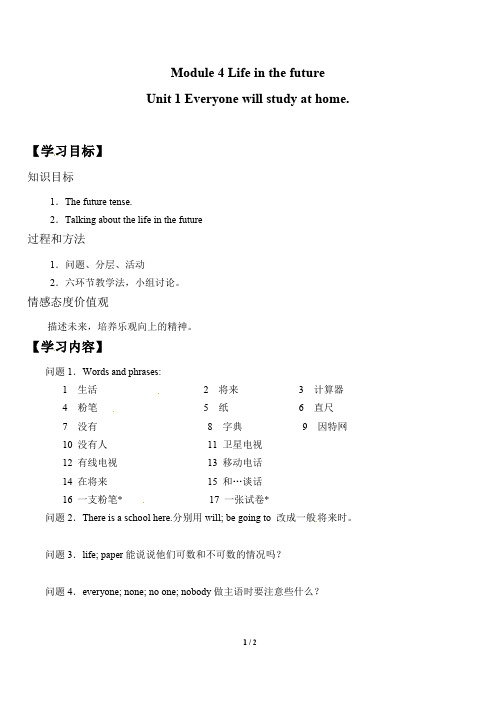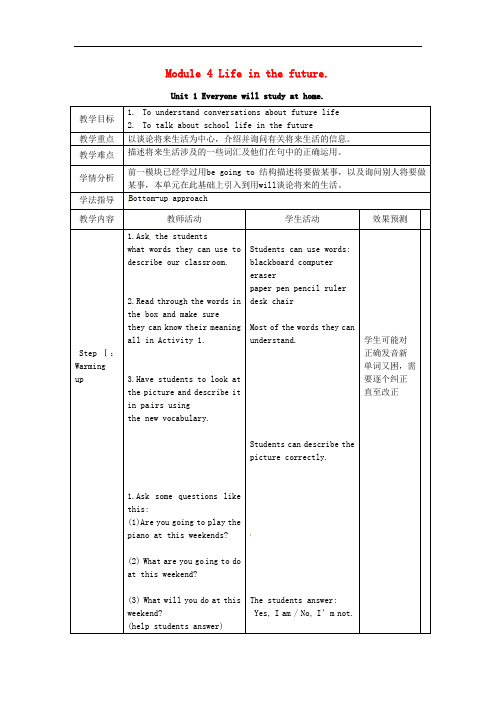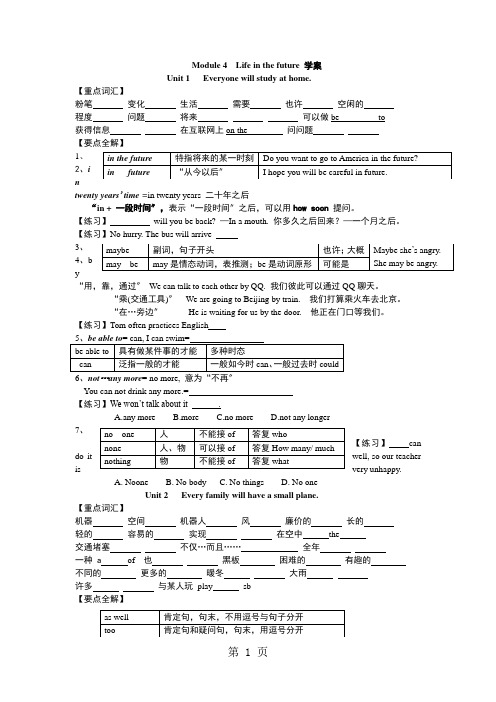导学案Module4 Unit1 Everyone will study at home.
- 格式:doc
- 大小:58.00 KB
- 文档页数:3

Module 4 Life in the future
Unit 1 Everyone will study at home.
【学习目标】
知识目标
1.The future tense.
2.Talking about the life in the future
过程和方法
1.问题、分层、活动
2.六环节教学法,小组讨论。
情感态度价值观
描述未来,培养乐观向上的精神。
【学习内容】
问题1.Words and phrases:
1 生活
2 将来
3 计算器
4 粉笔
5 纸
6 直尺
7 没有8 字典9 因特网
10 没有人11 卫星电视
12 有线电视13 移动电话
14 在将来15 和…谈话
16 一支粉笔* 17 一张试卷*
问题2.There is a school here.分别用will; be going to 改成一般将来时。
问题3.life; paper能说说他们可数和不可数的情况吗?
问题4.everyone; none; no one; nobody做主语时要注意些什么?
问题5.no和not 有什么异同?问题6.用…做…
1 我们用手写字。
2 他用电脑学英语。
3 请用刀切开这个苹果。

外研版七年级下册Module 4 Unit 1 Everyone will study at home学案Unit 1 Everyone will study at home.教案一、教学目标:1. 知识目标:通过学生自主学习,掌握本单元的词汇及短语。
2. 能力目标:能够听懂谈论未来的简短对话,判断未来事实。
能用will 表达自己对未来学校的想象。
3. 情感目标:通过对未来学校的憧憬,培养乐观向上的精。
二、教学重、难点:1. 掌握“will +动词原形”的用法。
2. There be 句型的一般将来时态。
三、教具准备:学案,录音机四、教学方法:自主学习,小组合作五、教学步骤:Step 1: Warming-up1. Greeting each other.2. Talk with the students.Where are you?What are you doing now?Ok. Today everyone studies at school.What will happen in the future?Perhaps everyone will study at home in the future.Step 2: Vocabulary.Check the preparation, and read them.Use the Picture in Activity 1.Ask: What can you see in it?Look around our classroom.What words can you use to describe our classroom?Work in groups, solve Activities 2 and 3.Step 3: Listening1. Daming and Betty are talking about schools in the future. Listento the tape and finish Activity 4.Check the answers. Fill in the blank on your papers.Solve the questions that the students have.2. Play the recording, students listen and repeat.Practise reading the dialogue in pairs.Ask some pairs to act out the dialogue.3. Work in groups, answer the questions as quickly as you can.4. Do you have any questions? Solve the questions.5. Complete the sentences according to the dialogue.Step 4: ExpansionAccording to the dialogue to describe what your school will be like in 10 years.Step 5: Test1. Finish the exercises on the paper by yourselves.2. Check in pairs.Step 6: HomeworkFinish off the exercises in your workbook.Preview next unit.Module4 Life in the future.Unit 1 Everyone will study at home.学案一.学习目标:1. 知识目标:通过自主探究,掌握本单元的词汇及短语。



Module 4 Life in the future 学案Unit 1 Everyone will study at home.【重点词汇】粉笔 变化 生活 需要 也许 空闲的 程度 问题 将来 可以做be to 获得信息 在互联网上on the 问问题【要点全解】1、 2、i ntwenty years ’ time =in twenty years 二十年之后“in + 一段时间〞,表示“一段时间〞之后,可以用how soon 提问。
【练习】 will you be back? —In a mouth. 你多久之后回来?—一个月之后。
【练习】No hurry. The bus will arrive3、 4、b y“用,靠,通过〞 We can talk to each other by QQ. 我们彼此可以通过QQ 聊天。
“乘(交通工具)〞 We are going to Beijing by train. 我们打算乘火车去北京。
“在…旁边〞 He is waiting for us by the door. 他正在门口等我们。
【练习】Tom often practices English6、not any more = no more, 意为“不再〞You can not drink any more.=【练习】We won’t talk about it .A.any moreB.moreC.no moreD.not any longer7、 【练习】 can do it well, so our teacher isvery unhappy.A. NooneB. No bodyC. No thingsD. No one Unit 2 Every family will have a small plane.【重点词汇】机器 空间 机器人 风 廉价的 长的 轻的 容易的 实现 在空中 the交通堵塞 不仅…而且…… 全年一种 a of 也 黑板 困难的 有趣的 不同的 更多的 暖冬 大雨许多 与某人玩 play sb【要点全解】2、3、notonly……but also就近原那么【练习】Not only the students but also their teacher (be) enjoying the film.【总结】我们除了用“be going to+动词原形〞可以表示一般将来时外,我们还可以用“will+动词原形〞来表示一般将来时.will + v原形肯定句:主语+ will +动词原形+〔宾语〕+其他People will go to the moon some day.否认句:在will 的后面加not即可。

Module 4 unit 1 Everyone will study at home. Exercises:一. 翻译短语1. 不同____________________2. 在将来______________________3.在20年后__________________4. 在家学习__________________________5. 使用笔和纸________________6. 有大量空余时间_____________7.通过电邮_______________8. 检查学生们的水平______________________9. 在网上得到信息_____________________10. 问问题__________________二. 单项选择1. They will _____ a party next Sunday.A. to haveB. hasC. havingD. have2. The teacher will _______ you a question, but no one answered.A. talkB. askC. speakD. say3. Where _____ you stay in the future?A. doB. willC. doesD. are4. My brother needs ________ some CDs.A. buyB. buysC. to buyD. bought5. Don’t worry. Everything ________ well.A. goB. goingC. goesD. /三.根据汉意及首字母提示写出所缺的单词。
1. Answer my q __________, please.2. The old woman is c__________ a big bag to the airport.3. We will be a_____ to speak English well.4. I don’t know the price of the book. M_________ twenty yuan.5. Will the city c_________ in twenty years?6. -- The ticket(票) is f________ .You needn’t pay money.7. In the near future, many of us will be able to go to work b______ car.四、用方框内所给单词或短语的适当形式填空be different, will, any more, be, have a picnic, be able to,make friends, enjoy oneself, check one’s emails, change1. There ________ no chalk in the classroom in the future.2. Maybe there __________ be any schools in twenty years!3. The colour of the liquid (液体)__________ from red to purple.4. He promises his parents not to swim in the river ____________.5. Their shirts are blue, and ours _________________ from theirs .6. I am looking forward to ___________________ with everyone here. They are friendly.7. Lingling asks me _______________________ with her on the beach.8. He __________________ very much when he is in the park. He feels happy today.9. Martin_________________________ (will) this weekend and write back to her pen pal.10. Lucy ________________ swim well after years of practice(练习).五. 句型转换。
Module 4Unit 1 导学案【学习目标】1. 知识目标:掌握本单元重点词汇及句型的用法;掌握一般将来时的结构will + V原形。
2. 能力目标:(1) 能听懂谈论未来的简短对话;(2) 能有will结构谈论对未来的想象。
3. 情感目标:通过对美好未来的憧憬,培养学生乐观向上的精神。
了解高科技与文化之间的关系,在享受高科技带来的便利的同时,能注意民族文化的传承。
【重点及难点】1. 重点:学习“will+动词原形”结构描述将来要做的事。
2. 难点:熟练准确地运用“will+动词原形”结构谈论将来的生活。
【学习过程】Step 1. Lead-in(1)布置学生预习词汇并按照音标朗读,小组解决自己不会拼读的词汇:life in the future blackboard cable TV calculator cell phone chalk computerdictionary email Internet paper pen pencil ruler satellite TV radio(2)课内探究检查词汇(小组竞赛)T: You have learned the words by yourselves, let’s have a check. Look at the pictures and say the words quickly. (教师展示图片,学生根据图片快速说出单词。
)T: Which words can you use to discribe our classroom? (学生小组活动用上这些单词描述自己的教室,教师提问几名学生。
)(3) Free talk.T: We are having an English class now. Can you tell me what do you use to study English? (教师提问两名学生做示范)S1: I use a dictionary to study English.S2: I use a pen to study English.T: Work in groups, ask and answer “What do we use to study English?”Then give us a report, use the sentence: Everyone uses…No one uses... (结合新单词,学生小组讨论并展示句型。
Module4 Unit1 第1课时导学案一、教学内容外研版小学英语六年级上册第四模块第一单元第一课时:Unit1 1. Look, listen and say. 2. Listen, read and act out.二、教学目标1. 大多数学生能够听、说、读、写单词或短语:Thanksgiving, Thanksgiving Day, flag, Flag Day, American, special, meal, sound, football2. 大多数学生能够听懂并用句型:Thanksgiving is my favourite festival. We always have a special meal. We say “thank you” for our food, family and friends. 谈论感恩节。
3. 能够运用所学的语言知识与同伴进行交流。
三、教学重难点重点:1. 听说读中单词和短语:Thanksgiving, Thanksgiving Day, flag,Flag Day, American, special, meal, sound, football 。
2. 学习句型:Thanksgiving is my favourite festival. We always have a special meal. We say “thank you” for our food, family and friends.难点:1. 用句型:Thanksgiving is my favourite festival. We always have a special meal. We say “thank you” for our food, family and friends. 谈论感恩节。
2. meal与dinner 的用法。
3. football(美式)橄榄球,soccer(英式)足球。
Module4 Unit1 Everyone will study at home.
Class_________ Name_________ Group_________
【学而有的】(Learning aims):
1.掌握本单元单词: cable TV, calculator, cell phone, email, Internet, chalk,
no one, everyone .
2.学习一般将来时,掌握一般将来时的结构will + V原形.
【学而有难】(Learning difficulties):
熟练准确地运用“will+动词原形”结构谈论将来的生活。
【学而有备】(Independent learning and communication)
累足成步
小组合作预习课文,在课本上划出重点单词、短语、句型;并标出自己的疑难点。
披荆斩棘
单词过关我能行!
1. What will you do in the f________.
2.He was c ______a box on his shoulder(肩).
3. The teachers won’t write on a blackboard with c________ .
4. Are you f____ this evening?
5. M _____we can get together tomorrow.
6. Do you have a r_____? I want to draw a line.
再接再厉
阅读课文,填写以下句子。
1. Everyone _______study at home.
2. Maybe there _______ be any schools.
3.________schools be different in the future? Yes, they _______.
4._______ students have a lot of homework to do? No, they _______.
总结:由will构成的一般将来时,表示_____________________________, 其基本结构是:_________________
注意:will是情态动词,本身没有的变化。
句式构成:否定句
一般疑问句及肯否回答
特殊疑问句
其中there be句型的一般将来时句子构成是:
思考:用be going to和will表达的一般将来时侧重点有何不同?
be going to主要用于表达
will主要用于表示
链接: 问对方是否愿意做某事和表示客气的邀请或命令时,常用will。
口语中常用would 代替will。
拓展:你知道一般将来时的标志词有哪些?
勤加练习:
①I am going to swim this Sunday afternoon.(同义句转化)
I _______ _______ to swim on this Sunday afternoon.
②There _____ a football match tomorrow afternoon. A. will have B. will be C. will has 【学而有道】(Learning procedures)
Step 1 Enjoy a video: our life in the future
Step 2 learn some new words and phrases.
Step 3 listen and answer some questions.
Step 5 Read this passage, and then finish a short passage.
Step 6 Group work. Talk about our class in the future.(注意使用will do和won’t do)
以下单词和短语可供参考:
have computers study at home
use chalk have more free time
have robots use pens and paper
carry lots of books to school ……
Step 7 Do an exercise.
Step 8 Free talk.
【学而有练】(Tests in class)
Betty:Will there be schools in the ?
Daming:No, there . I think that everyone will study at home and will use . They won't use books. They'll
use the .
Betty: And will they send their homework to the teachers email?
Daming: Yes, they will. And students will to their teachers on
their computers.
Betty: I'm not sure. I think students will use computers, but in school. Everyone will have a computer on their desk. They read books or use the
Internet. The teachers won't write on a blackboard with . And
no one will use , pencils and pens!
【学而有为】(Tests after class)
Please write a passage about what your school will be like in the future.(字数在60-80左右)
_______________________________________________
_______________________________________________
_______________________________________________
______________________________________________
【学而有悟】What do we learn today? Let’s summarize.
_____________________________________________________________
_____________________________________________________________。